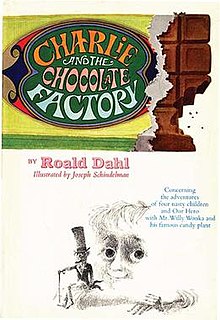
Back تشارلي ومصنع الشوكولاتة (رواية) Arabic Çarli və şokolad fabriki (roman) Azerbaijani Чарлі і шакалядная фабрыка BE-X-OLD Чарли и шоколадовата фабрика Bulgarian চার্লি অ্যান্ড দ্য চকলেট ফ্যাক্টরি (উপন্যাস) Bengali/Bangla Charlie i la fàbrica de xocolata Catalan Karlík a továrna na čokoládu Czech Charlie a'r Ffatri Siocled Welsh Charlie og chokoladefabrikken (roman) Danish Charlie und die Schokoladenfabrik German
 First US edition | |
| Author | Roald Dahl |
|---|---|
| Illustrator |
|
| Country | United Kingdom |
| Language | English |
| Genre | Children's fantasy novel |
| Publisher |
|
Publication date | 17 January 1964 (US version) 23 November 1964 (UK version) |
| Pages | Unknown |
| OCLC | 9318922 |
| Followed by | Charlie and the Great Glass Elevator |
Charlie and the Chocolate Factory is a 1964 children's novel by British author Roald Dahl. The story features the adventures of young Charlie Bucket inside the chocolate factory of eccentric chocolatier Willy Wonka.[1]
The story was originally inspired by Roald Dahl's experience of chocolate companies during his schooldays at Repton School in Derbyshire. Cadbury would often send test packages to the schoolchildren in exchange for their opinions on the new products.[2] At that time (around the 1920s), Cadbury and Rowntree's were England's two largest chocolate makers and they each often tried to steal trade secrets by sending spies, posing as employees, into the other's factory—inspiring Dahl's idea for the recipe-thieving spies (such as Wonka's rival Slugworth) depicted in the book.[3] Because of this, both companies became highly protective of their chocolate-making processes. It was a combination of this secrecy and the elaborate, often gigantic, machines in the factory that inspired Dahl to write the story.[4]
Charlie and the Chocolate Factory is frequently ranked among the most popular works in children's literature.[5][6][7] In 2012, Charlie Bucket brandishing a Golden Ticket appeared in a Royal Mail first class stamp in the UK.[8] The novel was first published in the U.S. by Alfred A. Knopf, Inc. in 1964 and in the U.K. by George Allen & Unwin 11 months later. The book's sequel, Charlie and the Great Glass Elevator, was written by Dahl in 1971 and published in 1972. Dahl had also planned to write a third book in the series but never finished it.[9]
The book has also been adapted into two major motion pictures: Willy Wonka & the Chocolate Factory in 1971 and Charlie and the Chocolate Factory in 2005. A stand-alone film exploring Willy Wonka's origins titled Wonka was released in 2023. The book has spawned a media franchise with multiple video games, theatrical productions and merchandise.
- ^ "Charlie and the Chocolate Factory". Britannica. Retrieved 5 August 2021.
The five children are greeted outside the factory by the eccentric visionary Willy Wonka.
- ^ "Repton School 'helped inspire Dahl' to write Charlie". BBC. 12 November 2015. Archived from the original on 14 October 2018. Retrieved 21 June 2018.
- ^ "Chocolate Wars, The inspiration for Charlie and the Chocolate Factory". Slate. Retrieved 27 July 2021.
During Dahl's childhood, the two largest British candy firms, Cadbury and Rowntree, sent so many moles to work in competitors' factories that their spying became legendary
- ^ Bathroom Readers' Institute. "You're My inspiration." Uncle John's Fast-Acting Long-Lasting Bathroom Reader. Ashland: Bathroom Reader's Press, 2005. 13.
- ^ "This classic has been named the nation's most-loved children's book". The Scotsman. Retrieved 14 July 2022.
Charlie and the Chocolate Factory has been named the nation's most-loved children's book. Three of Roald Dahl's children's novels dominate the top of a list of the best bedtime stories with The BFG coming second, and in third place, Matilda.
- ^ "Roald Dahl voted best author in primary teachers survey". BBC. 30 March 2012. Retrieved 16 July 2015.
In this survey of primary school teachers Dahl also placed five books in the top ten: Charlie, The Twits, Danny the Champion of the World, The BFG, and George's Marvellous Medicine
- ^ "REVEALED: Top 50 children's books and top 20 best-loved children's characters". Telegraph and Argus. Retrieved 14 July 2022.
1. Charlie and The Chocolate Factory – Roald Dahl
- ^ Flood, Alison (9 January 2012). "Roald Dahl stamps honour classic children's author". The Guardian. Retrieved 9 January 2022.
- ^ Martin Chilton (18 November 2010) The 25 best children's books Archived 15 February 2018 at the Wayback Machine The Daily Telegraph
© MMXXIII Rich X Search. We shall prevail. All rights reserved. Rich X Search